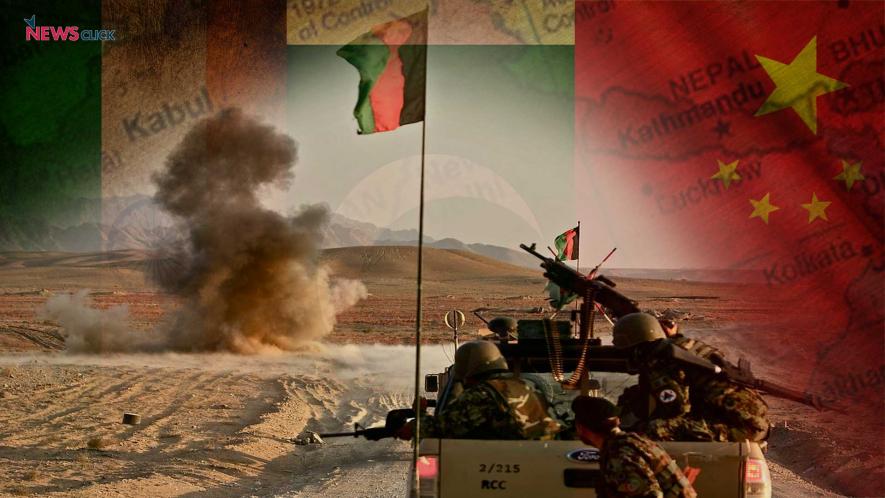Can India Replace Pakistan for a Long-term Solution in Afghanistan?

Newsclick Image by Nitesh Kumar
The new strategy by President Donald Trump to continue military intervention in Afghanistan may have scorned Pakistan and encouraged India but the route to ‘American-sought victory’ in the war-torn country goes through both the countries.
After President Trump battered Pakistan earlier last week, the country postponed a visit by US acting Assistant Secretary of State Alice Wells, the very first visit of a high state functionary after the speech. Protest broke-out across the country, even if small, against Trump who mostly held Pakistan responsible for current stalemate in Afghanistan. A ‘high alert’ was sounded and a group of protesters had to be smoked before they could reach the US consulate building.
Even as Trump’s plan to tighten noose around Pakistan may appear a new strategic decision. Many already found it uncalled for or even too late after almost two decade old tactical alliance in the war. But, some found it brazen display of desperation. Nonetheless more than sixteen year after the US intervention in Afghanistan, it is well a quagmire reminiscent of the ruthless legacy it bears, of being the graveyard of empires.
There is still hope that the legacy, if not completely destroyed as was the original plan, can be altered provided some amendments are made.
To do that, however, the regional players including India, Pakistan and China have to be brought together not to end the insurgency or eliminate terror outfits but for the longterm political stability of the country. On the contrary, Trump’s recent jibe at Pakistan seemed like a well calculated move continue the deadlock.
The frontier between Pakistan and Afghanistan doesn’t really matter. The capital cities in these two nations are different but the countries are more or less similar on two sides of Durand Line. This is to say that the people in these countries, along the frontiers despite all of loathing, are connected by tribal equations. Pakistan for decades was able to hold intact its federal provinces until only after War on Terror led to one of the gravest internal insurgencies in the country almost sinking it. Since then, Pakistan has come a long way dealing such problems with counter-insurgency operations like Zarb e Azab within the country and simultaneously holding a front in Afghanistan.
In Pakistan, the US has the most prolific ally unless it itself withers its influence at the hands of “agents of chaos”, Trump referred to in his speech. But, at the same time as China reacted to the Trump statement lauding Pakistan’s role also comes as a sign of China’s victory more than the US’ or of Pakistan in the region and result in the realignment between regional powers.
For US interests in a country like Afghanistan that shares its borders with Pakistan, China, Iran and three other central Asian countries, India as a significant regional power can be a distinct ally but not an alternative. For India, always willing to increase its influence in Afghanistan against Pakistan means a tactical regional gain but how far will India go to do so. A long-term political solution in Afghanistan could also mean negotiating with Taliban and that would not be difficult with Pakistan on board.
The long-term strategy on Afganistan will also ae to take into onsideration te 46 billion dollar Cina Pak eonomi Corridor (CPEC) wi as strengthened Pakistan’s partnersip wit China. Bot of tem ae to be on board for regional stability and security. Also, wat is more important is te relationsip between India, Pakistan and Cina as well. Wit tensions between tese regional nations, no one will be itorious in Afganistan.
Get the latest reports & analysis with people's perspective on Protests, movements & deep analytical videos, discussions of the current affairs in your Telegram app. Subscribe to NewsClick's Telegram channel & get Real-Time updates on stories, as they get published on our website.























